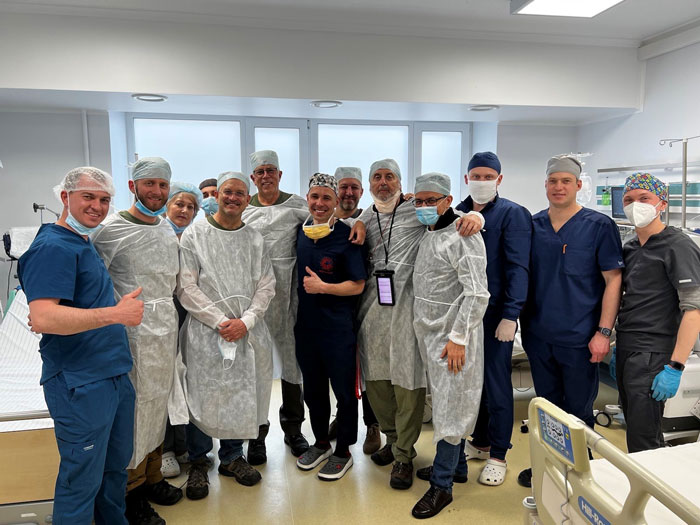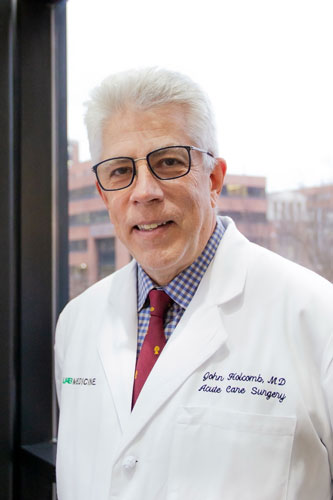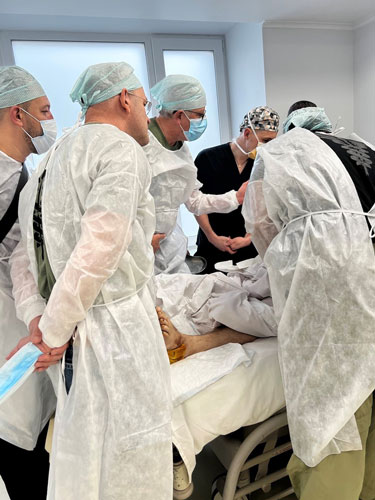 In April 2022, when John Holcomb, M.D., FACS, a professor in the UAB Division of Trauma and Acute Care Surgery, was asked if he would join a medical nonprofit to assist surgeons in Ukraine amid Russia’s invasion, he didn’t hesitate to volunteer. After clearing his plans with division leadership, and, of course, his wife, he was on a plane four days later. Holcomb has since made three trips to Ukraine with the Global Surgical and Medical Support Group (GSMSG), a nonprofit that takes medical care and training to crisis zones across the world.
In April 2022, when John Holcomb, M.D., FACS, a professor in the UAB Division of Trauma and Acute Care Surgery, was asked if he would join a medical nonprofit to assist surgeons in Ukraine amid Russia’s invasion, he didn’t hesitate to volunteer. After clearing his plans with division leadership, and, of course, his wife, he was on a plane four days later. Holcomb has since made three trips to Ukraine with the Global Surgical and Medical Support Group (GSMSG), a nonprofit that takes medical care and training to crisis zones across the world.
Holcomb, a retired Army colonel with 23 years of service, is no stranger to the combat zone. He served in multiple combat deployments, including in Mogadishu, Somalia, where he was a part of the surgical team that delivered 48-hour nonstop care to soldiers during the battle that inspired the book and film “Black Hawk Down.” He later served as the commander of the U.S. Army Institute of Surgical Research and Trauma Consultant for the Army surgeon general.
 John HolcombHolcomb is also a renowned trauma researcher and his findings, including the benefits of whole blood resuscitation and tourniquets, have improved both combat casualty care and civilian trauma care. He has helped redesign the evacuation system for wounded soldiers and standardize modern military medical care.
John HolcombHolcomb is also a renowned trauma researcher and his findings, including the benefits of whole blood resuscitation and tourniquets, have improved both combat casualty care and civilian trauma care. He has helped redesign the evacuation system for wounded soldiers and standardize modern military medical care.
Each two-week rotation with GSMSG in Ukraine for Holcomb includes working with a civilian hospital and burn center in Lviv. He provides individual patient care in the operating room, ICU, and on the hospital floors. He also advises on complex wounds, teaches combat care, gives lectures, works with medical students and residents, and is helping to refine the systems of care and propose policy updates.
Holcomb says the majority of the casualties in war are civilians, and the injuries he’s seen in Ukraine mirror what he saw in Iraq and Afghanistan: amputations and soft tissue injuries caused by explosive weapons. “The uniforms and country are different but human anatomy is the same,” Holcomb says. “The destruction of the human body is the same.”
 The doctors he works with in Ukraine are open to the hard-won lessons learned by the U.S. military, but Holcomb says there’s a learning curve on the battlefield. “Our goal is to compress that curve from a couple of years to a couple of months.”
The doctors he works with in Ukraine are open to the hard-won lessons learned by the U.S. military, but Holcomb says there’s a learning curve on the battlefield. “Our goal is to compress that curve from a couple of years to a couple of months.”
One such hard-won lesson? The immense benefit of whole blood—not just blood products—for trauma resuscitation. He says within a few weeks of his first visit, the hospital made the switch to whole blood.
Holcomb says there’s also an emotional component in the support he provides the Ukrainian surgeons, who, while experienced in caring for the severely injured, are taking on the new challenge of caring for civilians with combat injuries sustained during a war taking place in their home country. “Sometimes it’s saying, what you’re doing is exactly right.”
